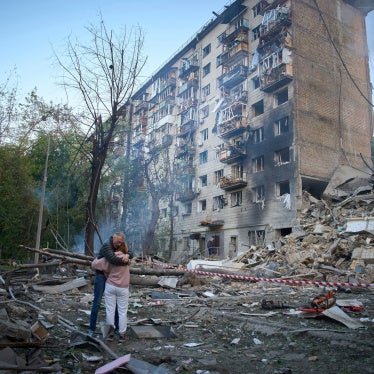Published in The Guardian
On the day of the funeral of Natalya Estemirova (Natasha to her friends), a leading investigative researcher for Memorial human rights centre in Chechnya, her friends and colleagues gathered at the Memorial office in Grozny. "Who is next in line?" a sign said. All of us there were devastated by Estemirova's brazen murder, following her abduction by unidentified men who appeared to be law enforcement officers, on 15 July.
Many women were crying, while the men stood there grimly, as if entranced. They knew someone would eventually be next, but thought that after Estemirova's killing there would be at least a lull, a respite. No one expected that less than a month later many of the same people would gather for another funeral. This time that of Zarema Sadulayeva and Alik Dzhabrailov, from a small Chechen charity, Save the Generation.
They were found dead in the trunk of Dzhabrailov's car on the outskirts of Grozny on 11 August, at about 4am, confirming the worst fears of their family and colleagues. They had been led away from their office in the Chechen capital the previous afternoon by five unidentified men, who said they were members of local security services. Three of them were wearing black uniforms and carried weapons.
Several of the men returned to the organisation's office soon afterward and took Dzhabrailov's mobile phone and his car. They assured the organisation's staff that Sadulayeva and Dzhabrailov were all right and would soon come back. They even left a mobile phone number "in case there would be any problems". In another couple of hours, with Sadulayeva and Dzhabrailov still missing, people tried calling the number - it proved to be out of the coverage area. By the next day there was neither time nor reason to continue to call - the funeral of Sadulayeva and Dzhabrailov had to be arranged.
Save the Generation is a non-governmental organisation founded in 2001 that provides psychological and physical rehabilitation to children with disabilities, orphans and victims of landmines in Chechnya. Sadulayeva, one of its founders and most active members, started running the group in 2005, after the murder of its first director, Murad Muradov. Dzhabrailov joined the organisation when he married Sadulayeva this year.
Estemirova had worked on some of the most sensitive cases of rights abuses in Chechnya: she documented extrajudicial executions, acts of torture and enforced disappearances by Chechen law enforcement and security agencies, and the Chechen authorities did not mince words to express their discontent with her and Memorial on numerous occasions. By contrast, Save the Generation stayed away from sensitive political issues and controversy, focusing on humanitarian problems. What made Estemirova and Sadulayeva similar, in addition to their horrifying deaths, was their unwavering dedication to helping the victims in Chechnya and their absolute independence from local authorities.
Independent activists are not tolerated in contemporary Chechnya. This intolerance goes far beyond the seething contempt officials have expressed for human rights activists - it can be lethal. As with the murder of Estemirova, there are grounds for suspecting official collusion by local authorities in the killing of Sadulayeva and Dzhabrailov and this possibility needs to be pursued by the investigation.
These killings brings to four the number of activists working on Chechnya who have been killed this year, starting with Stanislav Markelov, a prominent human rights lawyer, in January. The perpetrators of all these crimes are at large, and this stark impunity is apparently inspiring more vicious and deadly attacks on activists in the region. Only a thorough, effective investigation that ends in the prosecution of the killers can put an end to the chain of attacks. Otherwise, more murders are bound to follow and we'll keep asking ourselves, "Who's next in line?"







